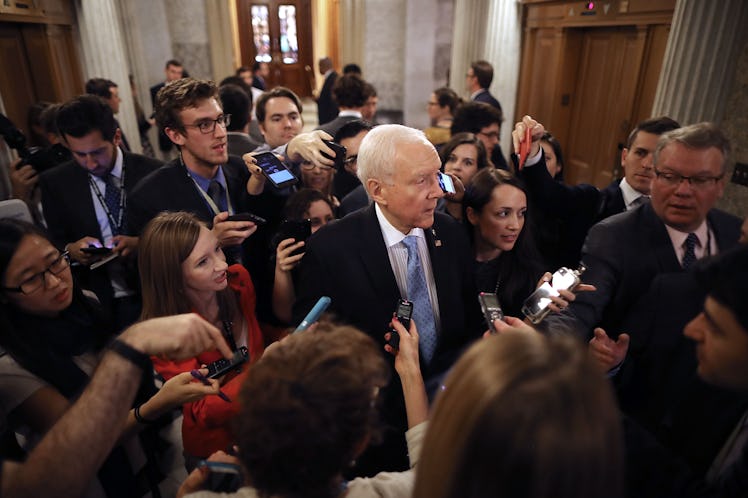
The GOP Is Trying To Stop A Government Shutdown, But It's Getting Close
After drama in Congress over the narrowly passed tax reform bill, Capitol Hill has yet another hurdle to cross this week. The GOP has until Friday to avoid a government shutdown, by which time they'd need a temporary funding measure passed. But getting there by Dec. 8 is easier said than done.
With funding set to expire in four days, Republicans are looking to get a Band-Aid solution by Friday that will keep the lights on, buying them some time while they work towards their longer-term funding plan. Congress still has yet to secure funding for the current fiscal year, which began Oct. 1. Democrats are pushing to have non-defense spending increased, while many in the Republican camp want to see more going to the military. Current spending caps in place are holding up both of those goals, and temporary stop-gap funding would be needed to first get those caps removed, then to get votes for the spending package with higher limits.
As the majority in Congress, it's on the GOP to keep the government running. With plenty of party members in both houses, it would reflect poorly on Republicans if they're not able to scrape together the votes to keep the government in business.
Senate Majority Leader Mitch McConnell expressed confidence that the shutdown wouldn't come to pass, saying on Sunday that "it's just not going to happen."
But there's not much room for error. Republicans need the Democrats' votes on the spending measure in order to pass, and their support is in question after an ongoing feud with President Donald Trump and demands about protections for Deferred Action for Childhood Arrivals (DACA) beneficiaries, known as "Dreamers." Extra pressure is on after the Republican party had a major legislative victory on Saturday, Dec. 2 in passing the Senate's tax reform bill on a 51-49 vote.
The looming deadline comes after Democrats last month began leveraging demands of a bill that included protections for Dreamers in order to get their support. A report from the Washington Post on Nov. 30 showed that Trump was said to be looking favorably at a shutdown, thinking it could be politically beneficial for him.
The report of Trump's opinion on a shutdown followed a tweet by the president on Nov. 28, which put dealmaking with Democratic leaders in jeopardy. "Meeting with 'Chuck and Nancy' today about keeping government open and working," Trump tweeted. "Problem is they want illegal immigrants flooding into our Country unchecked, are weak on Crime and want to substantially RAISE Taxes. I don’t see a deal!"
During a government shutdown, essential, life-saving services are generally preserved. The U.S. Postal Service, the military, air traffic controllers, etc. are all still on the job, but things like national parks and zoos would shutter their gates, and loan and passport applications can get delayed. And, ironically, Washington D.C. would be without garbage collection. Perhaps the biggest risk to a shutdown is losing voter faith. It simply isn't a good look for the party in charge to be unable to even secure something as basic as funding their own government.
Per Vox, the country has gone through with a government shutdown 18 times since the process took effect in 1976. It's not uncommon for Congress to be staring down the barrel of a shutdown, but it's seldom that it ever comes to fruition. In some instances, the shutdown is more of a bargaining chip, as the optics on a shutdown are a majority party's nightmare. In fact, Democrats used the threat of a shutdown last December in order to push a healthcare bill for miners, and in April, the GOP was facing the same potential-shutdown situation.
To pass the long-term spending plan will be another massive effort of reconciliation of both parties' demands. Whether they can pull out an agreement this week to avert a shutdown is the big question. Approving government funding seems like an obvious win, but with the legislative drama that's already plagued 2017, made worse by the president's feuding, it's not over until it's over.